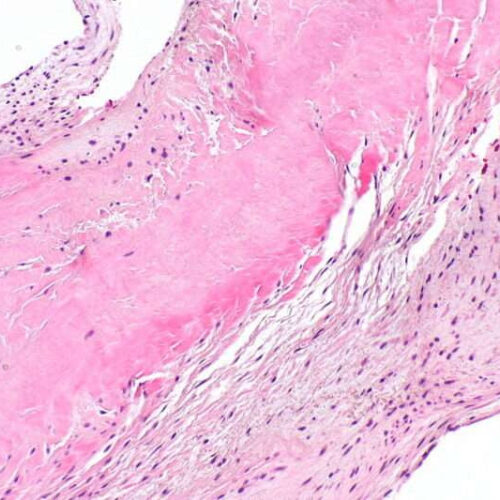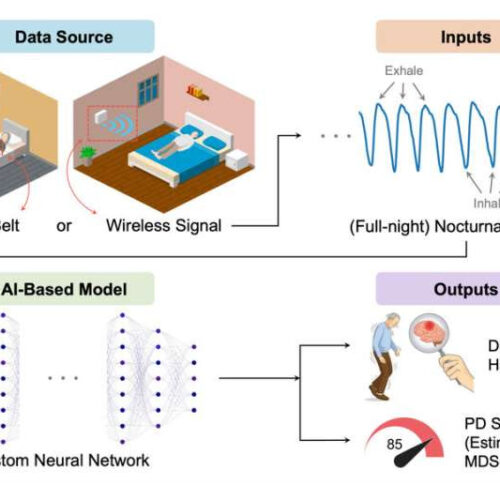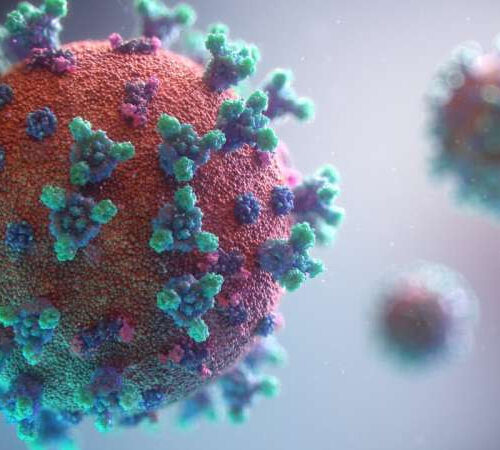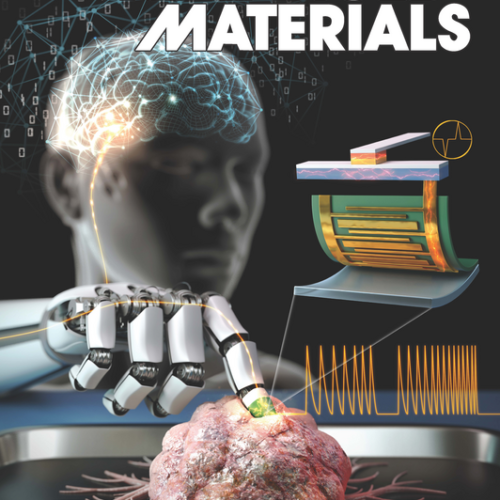by European Society of Cardiology Micrograph showing calcific aortic stenosis, abbreviated CAS. Nephron/Wikimedia Commons, CC BY-SA 3.0 A novel artificial intelligence (AI) algorithm uses routine echocardiograms to identify aortic stenosis patients at high risk of death who could benefit from treatment. The late breaking research was presented in a Hot Line session on 28 August at ESC Congress 2022....
Category: <span>Artificial Intelligence</span>
Artificial intelligence model can detect Parkinson’s from breathing patterns
by Alex Ouyang, Massachusetts Institute of Technology The system extracts nocturnal breathing signals either from a breathing belt worn by the subject, or from radio signals that bounce off their body while asleep. It processes the breathing signals using a neural network to infer whether the person has Parkinson’s, and if they do, assesses the...
Artificial intelligence can explain why each COVID-19 wave impacts people differently
by University of Surrey Credit: Unsplash/CC0 Public Domain Researchers have identified what they believe to be robust metabolic markers of COVID, a discovery that could lead to better understanding and treatments for people that suffer from symptoms of the disease months after diagnosis. Scientists from the University of Surrey collected blood samples of hospital patients and found that COVID-19...
Advancing dynamic brain imaging with AI
COLLEGE OF ENGINEERING, CARNEGIE MELLON UNIVERSITY MRI, electroencephalography (EEG) and magnetoencephalography have long served as the tools to study brain activity, but new research from Carnegie Mellon University introduces a novel, AI-based dynamic brain imaging technology which could map out rapidly changing electrical activity in the brain with high speed, high resolution, and low cost....
Biologists train AI to generate medicines and vaccines
Scientists have developed artificial intelligence software that can create proteins that may be useful as vaccines, cancer treatments, or even tools for pulling carbon pollution out of the air. This research, reported today in Science, was led by the University of Washington School of Medicine and Harvard University. The article is titled “Scaffolding protein functional sites using...
AI-driven device could surpass limits of traditional vital signs for predicting patient deterioration
by Noah Fromson, University of Michigan Credit: Pixabay/CC0 Public Domain An artificial intelligence-driven device that works to detect and predict hemodynamic instability may provide a more accurate picture of patient deterioration than traditional vital sign measurements, a Michigan Medicine study suggests. Researchers captured data from over 5,000 adult patients at University of Michigan Health with the Analytic...
Using AI to improve your dental care and keep you smiling
Interview conducted by Emily Henderson, B.Sc. Jul 15 2022 In this interview, we speak to Severin Stalder, CEO of Zaamigo, about their AI dental camera and how it is helping to improve people’s dental hygiene. Please can you introduce yourself and tell us about your role at Zaamigo? Hi! I am Severin and the founder...
AI applied to prediagnostic CTs may help diagnose pancreatic cancer at earlier, more treatable stage
MAYO CLINIC ROCHESTER, Minn. — A study published in Gastroenterology finds that radiomics-based machine learning models may detect pancreatic cancer on prediagnostic CT scans substantially earlier than current methods for clinical diagnosis. “Pancreatic cancer is a deadly disease and a leading cause of cancer-related death,” says Ajit Goenka, M.D., a Mayo Clinic diagnostic radiologist and the...
Machine learning begins to understand the human gut
The communities formed by human gut microbes can now be predicted more accurately with a new computer model developed in a collaboration between biologists and engineers, led by the University of Michigan and the University of Wisconsin. The making of the model also suggests a route toward scaling from the 25 microbe species explored to the thousands...
Malignant or benign? Quick and accurate diagnosis with artificial tactile neurons
NATIONAL RESEARCH COUNCIL OF SCIENCE & TECHNOLOGY IMAGE: THE RESEARCH RESULTS ARE PUBLISHED AS AN INSIDE BACK COVER PAPER IN ADVANCED MATERIALS. CREDIT: KOREA INSTITUTE OF SCIENCE AND TECHNOLOGY (KIST) The stiffness levels and distributions of various biological materials reflect disease-related information, from cells to tissues. For example, malignant breast tumors are usually stiffer and...






